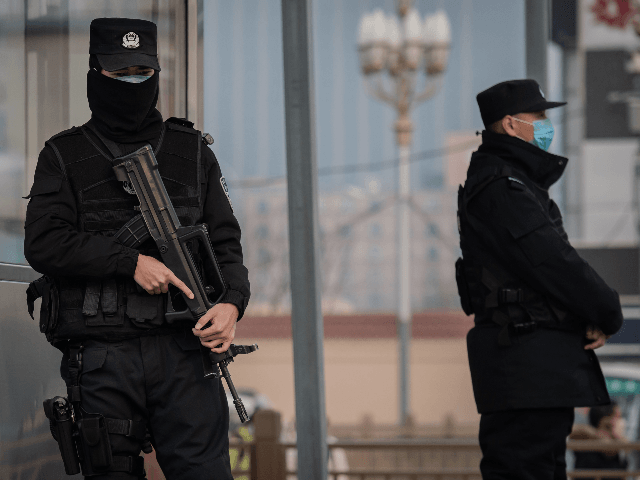A Chinese official in the troubled Xinjiang province, where China has been herding millions of Uyghur Muslims into concentration camps, told Radio Free Asia (RFA) this week that information about the spread of the Wuhan coronavirus is a “state secret” that cannot be discussed with the public.
Much apprehension surrounds the possibility of the coronavirus running wild through the crowded and unsanitary Uyghur detention camps.
RFA noted in its Monday report on the coronavirus in Xinjiang that 24 confirmed infections have been reported so far, plus another 1,254 people under observation. Thousands of test kits, masks, and gloves have been shipped to the province in anticipation of the epidemic spreading further.
RFA correspondents found Xinjiang officials “tight-lipped” about the state of the virus in their region, with most of them refusing to comment at all beyond some boilerplate about how hard the authorities are working to keep the public safe:
When asked how many people had been infected, an employee at a 120 emergency call center in the seat of Kashgar (Kashi) prefecture said they did not know and referred questions to the municipal health bureau, while an emergency services staffer in the Changji Hui (Changji Huizu) Autonomous prefecture’s Sanji (Changji) city said “I cannot answer that … [because] I don’t know who you are.”
A government employee in Urumqi, when asked about the number of infected, told RFA that “I can’t talk with you on the phone about state secrets like this.”
A health bureau employee in Akto (Aketao) county, in Kizilsu Kirghiz (Kezileisu Keerkezi) Autonomous Prefecture, did not provide numbers of cases, but said that staff members had been divided into seven groups to carry out work related to public safety.
“We’re working with the Public Security Bureau (PSB) to quarantine and disinfect people coming into the county,” the employee said.
“Everyday we’re also disinfecting in neighborhoods. We’re doing this in any place where a lot of people go.”
Foreign observers noted that China’s penchant for secrecy and bureaucratic paralysis are major reasons the Wuhan outbreak grew out of control in the first place, and both of those tendencies are even more pronounced in Xinjiang, along with the hundreds of thousands of malnourished potential victims packed into ugly camps with dubious hygienic standards. Some critics bluntly warn that Uyghurs held in the camps have weakened immune systems due to physical abuse and torture.
Business Insider called the Uyghur camp inmates “sitting ducks” for the coronavirus after the first two cases in Xinjiang were reported in January. Dolkun Isa of the World Uyghur Congress exile group warned “the lives of millions of people will be at stake.”
“We know for a fact that the conditions in the camps are horrible. Many people have contracted serious sicknesses due to the overcrowded and filthy conditions,” Isa said.
“China should do everything in its power to prevent the spread of the Wuhan virus into any camps because the consequences will be catastrophic, resulting possibly in the deaths of tens of thousands of Uyghurs arbitrarily detained,” he warned.
Australian Uyghur activist Arslan Hidayat went even further and warned the regime in Beijing could “use the coronavirus as an excuse to exterminate the millions of Uyghur Muslims in China’s concentration camps.”
Hidayat told Australia’s News.com last week that Uyghurs would, at best, find themselves low on China’s priority list for treatment as the epidemic grows.
“They’re barely getting enough [medicine] for Han Chinese citizens, let alone getting it out to Xinjiang. If it does end up spreading, the Uyghurs won’t get the same kind of support that they’re getting in Wuhan and cities on the eastern seaboard,” he said.
“They could use the Uighurs as guinea pigs to find a cure for the coronavirus. This is my worry,” he added, alluding to reports from camp veterans that inmates are often forced to take strange medicine, injected with unknown substances, and subjected to unexplained blood tests.

COMMENTS
Please let us know if you're having issues with commenting.